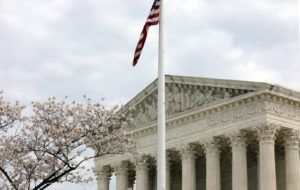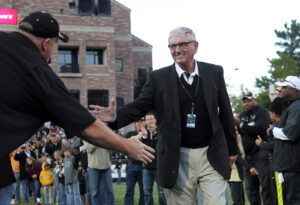
NEW ORLEANS (BP)–“The affirmations of Christianity within Islam make room for building bridges, and the differences leave room for explanations across barriers,” a leading authority on Islam told students and faculty at New Orleans Baptist Theological Seminary.
J. Dudley Woodberry, dean and professor of Islamic studies at Fuller Theological Seminary’s school of world mission in Pasadena, Calif., presented lectures on the NOBTS campus Feb. 27 on Islamic beliefs and culture and ways Christians can understand and nurture Muslim friends as they tell them about Christ.
The lectures were sponsored by NOBTS’ division of theological and historical studies. With approximately 1 billion adherents to Islam in the world (about one-fifth the world’s population) and more than 5 million Muslims living in America, “every student in this seminary will minister in an environment of religious pluralism,” said Gerald Wright, NOBTS associate professor of missions. Woodberry’s lectures focused on equipping students to minister in that environment, Wright said.
Woodberry, who has a Ph.D. in the study of religion from Harvard University and a master of arts in Arab studies from the American University of Beirut, Lebanon, developed a firsthand understanding of Islamic religion and culture while he was a missionary in Lebanon, Pakistan and Afghanistan from 1968-76 and then in Saudi Arabia for three years.
From 1976-79, he was pastor of the only church in Riyadh, Saudi Arabia’s capital, a role made possible by a local group of Christian expatriates. In that position, he was the first resident minister in the capital since the days of Mohammed, the prophet and founder of Islam who was born about 570 A.D. and died in 632.
Woodberry’s knowledge and understanding of the Middle East benefited the United States during the 1979-80 Iranian crisis in which U.S. Embassy staff members were taken as hostages.
During the crisis, Woodberry worked with the International Communications Agency and the U.S. State Department to develop an overview of the Islamic world for former President Jimmy Carter.
He also has trained personnel as an advisor for corporations such as Mobil, Shell, Ford, General Motors, 3-M, Martin-Marietta, Litton and Honeywell as they prepared to work in the Middle East.
In addition to his experience as a minister and adviser, Woodberry has been a professor of Islamic studies since 1979, teaching at Fuller since 1992.
While Christianity and the Islamic faith have several obvious differences, a few similarities also exist, Woodberry said, making communication and relationships possible.
For instance:
— Muslims refer to the same Creator God, the God of the Bible, as do Jews and Christians. However, in the Koran, the sacred text of Islam, God is called “the Loving One” but is loving only to those who love him.
— Muslims refer to Jesus as “Statement of the Truth,” “A Sign from God” and “faultless,” but not as divine. The Koran attributes to Jesus many of the same miracles recorded in the Gospels, but his incarnation, crucifixion and resurrection are missing. In contrasting Islamic beliefs about Jesus to those about Mohammed, Woodberry said, “No miracles are attributed to Mohammed in the Koran other than having received the Koran, and unlike Jesus, who is faultless, Mohammed is told by God to ask for forgiveness.”
— “Muslims view human nature as neutral or good, but they see the need for forgiveness,” Woodberry said, “but for Muslims there is no means of salvation because they believe God is God to forgive whom he will or won’t.”
— “In Islam, faith and works are both necessary and lead into salvation,” he said. “Like formal Judaism, in formal Islam the law tells us how to please God, but gives us no power to do it.”
Woodberry also presented a socio-cultural description of Muslims in Arab nations. Just as many types of Baptist denominations practice their beliefs in the United States, different types of Muslims, each affected by various cultures, exist throughout Arab nations.
“We need a spectrum of perspectives on the different types of Muslims,” Woodberry said. “We in the West tend to see the dark side of Islam from occurrences of terrorism, assassinations and hostage situations.”
However, Arab nations observing fundamental Islam may be either militant or peaceful, Woodberry said. On the other end of the spectrum are “nominal Muslims,” for whom Islam is part of their cultural identity, but they are actually agnostics, he said.
“Most Arabs are hospitable and generous,” Woodberry said. “They stress respect for age over youth and male superiority rather than equality of the sexes. Yet the woman plays a highly significant role in society through the home.”
Social reciprocity, the practice of exchanging equal gestures of kindness, is practiced, and intermediaries are used to work out problems between individuals, groups or countries, he said.
Islamic fundamentalism can be traced to the days of imperial colonialism in the early 1900s, Woodberry said. For Arab nations, the loss of power to Christian nations was traumatic, he said, because many of the Arab nations previously had been superpowers for hundreds of years.
As boundaries were drawn by the new ruling nations, geography was their main concern, not people groups or culture, and “colonial powers brought in ideas of nationalism based on ethnicity,” Woodberry said.
As the Arab nations began to acquire independence, it became increasingly important for the nations to establish a national identity, he said.
“If you don’t know who you are, that leads to political instability, which leads to suppression of the opposition,” Woodberry said. “When you then have military failure and conflicting values between traditionalists and modernists and you have industrialization, which does not benefit everyone, there is the polarization of society, of rich and poor.”
To unite a nation, a leader would look for a symbol with which all the people might identify, Woodberry said, noting, “Islam is that symbol for Arab nations.”
Additional factors Woodberry cited leading to a return to fundamental Islam include the breakdown of society, local disputes, urbanization, economic crisis and secularization.
“A great deal of incarnational listening and empathizing” is a critical element of the Christian response to Muslims, Woodberry said, as he described the most effective ways missionaries abroad and Christians in the United States can share their faith.
“We can echo the prophets to strive for reconciliation, care and justice. Many Muslim enemies such as secularization and immorality are Christian enemies,” Woodberry said, adding the mutual concerns of Christians and Muslims can be a starting point for establishing common ground to lead into witnessing opportunities.
Natural disasters and migration to the cities provide windows of opportunity for Christians to share God’s love and care, Woodberry said, as Christians provide aid to those in crisis or befriend those newly experiencing the intimidations of city life.
“When we witness to Muslims we need to be slow to judge,” Woodberry said. “When we compare religions, we must realize that Mohammed originally thought he was teaching the same thing as the Jews.” He also cautioned against stereotyping Muslims.
“It is possible to look at the Islamic religion as preparation for leading people to Christ,” Woodberry said.
“More Bibles were sold than ever before during the crisis in Iran, and Muslims came to know Jesus and be baptized; Pakistanis signed up for Bible courses; the Sudanese, a resistant people, responded (to the gospel) when they had suffered from fellow Muslims,” Woodberry said.
Such movements, he said, seem to take place only when a sufficient number of Christians are present.
“What does the hand of God look like?” he asked, as Christians minister to Muslims in the United States and around the world. It is “a hand that got dirty in the street, that felt the hammer of injustice.”
As Christians associate with Muslims, Woodberry said, “Our hands can cooperate with God’s hands.”
–30–












